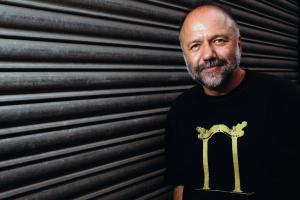The conflict in Ukraine has radically changed the lives of people across the country. The Ukrainian writer Andrey Kurkov speaks about new realities, literature in times of armed conflict and what Europe can do and learn about itself.
Interview conducted, condensed and translated from Russian by Elena Boroda
Andrey Kurkov is one of Ukraine’s most prolific writers. His stories and novels about people in his own country are surreal and ironic. In his “Ukraine Diaries” (2014) Kurkov hauntingly depicts the Euromaidan protests, the following months of upheaval and the possible falling apart of his own country. Kurkov writes in Russian.
Mr Kurkov, you are based in Kiev. Together with other Ukrainian authors you went on a reading tour to the war-torn Donbas region in March. How has conflict changed the lives of Ukrainian civilians?
The thinking, the thoughts have changed as has the reality. The economic crisis has devalued salaries. More than a million refugees have fled Ukraine’s east. Housing these people, sending their children to school are challenges we face as a society, as a country. Citizens, also in Kiev, host refugees and help them on a voluntary basis. The refugees expect more from the government. For them the voluntary help they get is not sufficient, whereas the people who help them consider this as ingratitude.
How has the reality of war and conflict shaped your writing?
Before the war I’ve been writing light as well as serious literature. Wartime literature reproduces reality. I have taken a break from writing prose, and so have many of my colleagues. During war and conflict literature as such vanishes.
So, Ukrainian writers have a radically new perception of events?
The post-Soviet Ukrainian literature was very young, very apolitical. Social and political topcis were almost non-issues. Most novels were written in the style of “sex, drugs and rock ’n‘ roll“– this literary form which didn’t exist in Soviet times and had caught up with us. Now it’s different. The same people who wrote about “sex, drugs and rock ’n ’roll”, write essays and patriotic screen plays. These works are the product of a political situation and not the expression of literary creation.
So, a step back for Ukrainian literature?
That’s a regularity –reality changes and so does literature. Writers will probably not go back to this apolitical existence. Today’s reader doesn‘t want to be entertained. What he wants is a provocation to ponder.
Do people need this new type of literature?
Everyone craves news. Literature has taken a back seat. Book sales have drastically declined. However, many more people come to author and poetry readings because they long to hear the vision and views of writers. This is not only the case in peaceful regions. In March I travelled with other writers to the Donbas region, along the anti-terror demarcation line. I have never seen 700 people come to a reading. Most people who came weren’t avid readers. They had come because literature is a symbol of peaceful times. I was amazed. People hadn’t come to hear patriotic prose which calls upon to take action but to listen to lyrical poetry. Human beings in war times are gripped by a longing for stability and the restoration of the destroyed world.
What can the West do to help resolve the conflict in eastern Ukraine?
The West needs to stick to its sanctions policy, continue putting economic and diplomatic pressure on Russia. Western politics will probably not halt Russia‘s Ukraine policy but can slow it down. I don’t think that a military solution will make Russia withdraw from eastern Ukraine.
What does this conflict mean for Europe, for its existence?
This conflict reminds Europe of its own fragility and the fragility of the European Union. In the EU there are countries which don’t want sanctions nor do they want to join in exerting diplomatic pressure on Russia. For its part, Russia actively supports separatist movements in the EU and also monitored the independence referenda in Scotland and Catalonia. Russia finances EU-sceptic parties such as Marine Le Pen’s Front National. Therefore, Europe needs to understand where the threat to its consensus-based unity stems from and should not aspire to be a union but seek a closer bond among its members.
“A Provocation to Ponder”

Copyright © 2024 The Brussels Times. All Rights Reserved.
